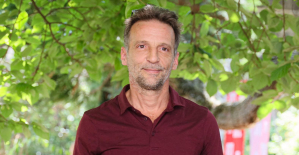"It's disastrous around here", describes the sheriff, who patrols the small rural county of Brooks in Texas, a few tens of kilometers from Mexico.
"We started to identify the corpses from 2009," he told AFP, pointing to twenty volumes, where more than 913 cases of death are listed.
But according to him, the real human toll is much greater.
“I would multiply that by five, maybe even ten, the number of bodies that will never be found,” he adds.
The sheriff counted and treated 80 corpses in 2022. "It's less than last year, but it's 80 too many".
The United States recorded a record 2 million border arrests during the year, as immigration emerged as one of the main issues debated ahead of the November 8 election. At least 700 people died during these crossings.
To avoid the checkpoint at Falfurrias, Brooks County's main town, migrants are led by smugglers to vast farms where dense vegetation and heat can quickly prove fatal.
- "Torture" -
In the municipal cemetery of the border town of Eagle Pass, about forty plaques are placed next to a small American flag and bear the mention John or Jane Doe, used in the United States for people of unknown identity.
So many men and women who saw their American dreams come to an end in unmarked graves.
On the other side of the city, migrants continue to arrive, choosing to risk their lives to escape the poverty and terror of their countries of origin.
"It was agony," says Alejandra, a 35-year-old Colombian who crossed the Rio Grande to reach Texas despite not being able to swim. "But it was scarier to go back."
Alejandra confides that she needed asylum because of the danger of organized crime she faced in Colombia.
"If we go back, they will kill us," she says, looking at her three children.
- What's left -
Corinne Stern, head of the main morgue in the region, explains that "the most common cause of death is hyperthermia or dehydration".
"Until about five years ago, (the border) occupied about 30% of my time... Today, it occupies about 75%," explains the doctor.
The morgue is impeccably clean, but the smell of decomposing bodies is omnipresent.
Because sometimes there is not much left of the bodies.
"If it's very hot, your body decomposes in 72 hours, and the animals shred the rest," says Urbino Martinez.
“We have already found human bones in the den of a rat,” adds the sheriff.
The vast majority of corpses found at the border have no identity papers on them, explains Corinne Stern, as she examines the skeletal remains of a still-clothed female body.
A small backpack is attached to the corpse. When the doctor lifts it, two colored lollipops fall from it, contrasting with the earthy ocher that covers the clothes and the bones.
DNA samples are being taken in an attempt to identify her, but for now she will be labeled as another Jane Doe, one of 250 Corinne Stern has cared for this year.
- "Where is my wife" -
For Eduardo Canales, 74, dying in anonymity is too cruel an end.
To remedy this, in 2013 he had water stations installed around farms to prevent migrants from drinking water from cattle troughs, which is toxic to humans.
It also provides barrels with location coordinates and a phone number to call for help.
But when he started getting calls from families looking for missing loved ones, he decided to expand.
"For me, the most important thing is that families can move on," he says.
"Families keep looking, they never give up. They keep asking where is my wife, my brother, my daughter?"
A partnership with the University of Texas has made it possible to exhume dozens of corpses and identify them using their fingerprints.
This collaboration has reduced the number of unmarked graves in Brooks: of the 119 migrants found in 2021, 107 have been identified.
"But many others die and disappear without us ever finding them," laments Eduardo Canales.
"Here, the only constant is death".

 Torrential rains in Dubai: “The event is so intense that we cannot find analogues in our databases”
Torrential rains in Dubai: “The event is so intense that we cannot find analogues in our databases” Rishi Sunak wants a tobacco-free UK
Rishi Sunak wants a tobacco-free UK In Africa, the number of millionaires will boom over the next ten years
In Africa, the number of millionaires will boom over the next ten years Iran's attack on Israel: these false, misleading images spreading on social networks
Iran's attack on Israel: these false, misleading images spreading on social networks New generation mosquito nets prove much more effective against malaria
New generation mosquito nets prove much more effective against malaria Covid-19: everything you need to know about the new vaccination campaign which is starting
Covid-19: everything you need to know about the new vaccination campaign which is starting The best laptops of the moment boast artificial intelligence
The best laptops of the moment boast artificial intelligence Amazon invests 700 million in robotizing its warehouses in Europe
Amazon invests 700 million in robotizing its warehouses in Europe Switch or signaling breakdown, operating incident or catenaries... Do you speak the language of RATP and SNCF?
Switch or signaling breakdown, operating incident or catenaries... Do you speak the language of RATP and SNCF? Transport in Île-de-France: operators are pulling out all the stops on passenger information before the Olympics
Transport in Île-de-France: operators are pulling out all the stops on passenger information before the Olympics Radio audiences: France Inter remains firmly in the lead, Europe 1 continues its rise
Radio audiences: France Inter remains firmly in the lead, Europe 1 continues its rise Russian cyberattacks pose a global “threat”, Google warns
Russian cyberattacks pose a global “threat”, Google warns A new Lennon-McCartney duo, more than 50 years after the Beatles split
A new Lennon-McCartney duo, more than 50 years after the Beatles split The Curse vs Immaculée: two thrillers but only one plot
The Curse vs Immaculée: two thrillers but only one plot Mathieu Kassovitz adapts The Beast is Dead!, the comic book about the Second World War and the Occupation by Calvo
Mathieu Kassovitz adapts The Beast is Dead!, the comic book about the Second World War and the Occupation by Calvo Goldorak 'has never lived so much as now'
Goldorak 'has never lived so much as now' Skoda Kodiaq 2024: a 'beast' plug-in hybrid SUV
Skoda Kodiaq 2024: a 'beast' plug-in hybrid SUV Tesla launches a new Model Y with 600 km of autonomy at a "more accessible price"
Tesla launches a new Model Y with 600 km of autonomy at a "more accessible price" The 10 best-selling cars in March 2024 in Spain: sales fall due to Easter
The 10 best-selling cars in March 2024 in Spain: sales fall due to Easter A private jet company buys more than 100 flying cars
A private jet company buys more than 100 flying cars This is how housing prices have changed in Spain in the last decade
This is how housing prices have changed in Spain in the last decade The home mortgage firm drops 10% in January and interest soars to 3.46%
The home mortgage firm drops 10% in January and interest soars to 3.46% The jewel of the Rocío de Nagüeles urbanization: a dream villa in Marbella
The jewel of the Rocío de Nagüeles urbanization: a dream villa in Marbella Rental prices grow by 7.3% in February: where does it go up and where does it go down?
Rental prices grow by 7.3% in February: where does it go up and where does it go down? Europeans: the schedule of debates to follow between now and June 9
Europeans: the schedule of debates to follow between now and June 9 Europeans: “In France, there is a left and there is a right,” assures Bellamy
Europeans: “In France, there is a left and there is a right,” assures Bellamy During the night of the economy, the right points out the budgetary flaws of the macronie
During the night of the economy, the right points out the budgetary flaws of the macronie Europeans: Glucksmann denounces “Emmanuel Macron’s failure” in the face of Bardella’s success
Europeans: Glucksmann denounces “Emmanuel Macron’s failure” in the face of Bardella’s success These French cities that will boycott the World Cup in Qatar
These French cities that will boycott the World Cup in Qatar Champions League: semi-final schedule revealed
Champions League: semi-final schedule revealed Serie A: AS Roma extends Daniele De Rossi
Serie A: AS Roma extends Daniele De Rossi Ligue 1: hard blow for Monaco with Golovin’s premature end to the season
Ligue 1: hard blow for Monaco with Golovin’s premature end to the season Paris 2024 Olympics: two French people deprived of the Olympic Games because of a calculation error by the international federation?
Paris 2024 Olympics: two French people deprived of the Olympic Games because of a calculation error by the international federation?


















